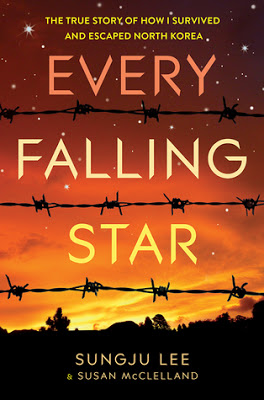Welcome to another session of Turning Pages!
Many teens struggle with historical fiction which seems like a genre of “long ago and far away.” The history of North Korea happened – and is still happening – right now. This book is a first-person bildungsroman useful for World History classes looking for an added dimension in their units on Communist governments. At times wistful and aching, this novel will give readers a tiny window into a world not their own. We need these stories, especially as the world grows more chaotic, to remember that we must have compassion for each other – we must. Or we’ll doom each other to believing the worst propaganda and lies about each other.
Synopsis: Life for Sungju in Pyongyang, North Korea, meant star-gazing with his grandfather, playing army with his parents, amusement parks, and picnics on warm afternoons. A child of privilege, Sungju lived much like an American kid – he went to his school and taekwondo lessons, listened as his mother played their baby grand piano, and didn’t worry much about anything. But life changed quickly, when Sunju was eleven. A “vacation” in the country from their beautiful home left them in a one-room shack in a coastal town. The prep-school where he proudly attended with good equipment and new books was exchanged for a little school with old books and students whose level he’d passed done long ago. Everyone was thin and weary looking, and suspicious. Naively, Sungju thought his classmates were lying, when they talked about eating squirrel. The money his parents had went not for private lessons or special picnics, but for simple peasant food… and soon even that wasn’t available. School outings weren’t museums, but executions. It was the 1990’s, and the system had broken. Soon, there were no longer rations for those who worked, and everyone — everyone — was foraging, then stealing. Even Sungju, who had known a different world.
While joining a gang gave Sungju a measure of self-respect, there was nothing which could return to him his parents, nor his sense of the world as being a safe and understandable place. But, with his friends beside him, Sungju refused to give up hope that something would make sense. His is a story of survival.
 Observations: We don’t actually have as much memoir and first person creative non-fiction as we should in YA lit. Hearing voices from other communities and other countries can be so valuable to teachers trying to find a way to humanize current events. Though this novel’s repeated tale of miseries, hunger, and gang battles may sometimes feel like a successful “thug life” story, the emotional resonance keeps the novel on track, and will, I think, open up a lot of thoughtful conversation afterwards, much like The Diary of Anne Frank and other such honest books. While the reader is held at somewhat a remove from the circumstances, the author still gives the narrative the feeling of “being there.”
Observations: We don’t actually have as much memoir and first person creative non-fiction as we should in YA lit. Hearing voices from other communities and other countries can be so valuable to teachers trying to find a way to humanize current events. Though this novel’s repeated tale of miseries, hunger, and gang battles may sometimes feel like a successful “thug life” story, the emotional resonance keeps the novel on track, and will, I think, open up a lot of thoughtful conversation afterwards, much like The Diary of Anne Frank and other such honest books. While the reader is held at somewhat a remove from the circumstances, the author still gives the narrative the feeling of “being there.”
The biggest message that readers receive is that there is very little difference in our lives, except for circumstance. We are who and where we are, not because we or our country is better, or because we’ve somehow earned our privilege, but because we are – in this turn of Fortune’s wheel, in this time and place – lucky and blessed. It is the author’s point, I think, that this should remind us to be compassionate – not only with others, but with ourselves, if and when our own fortunes change.
Conclusion: While at times painful, this book had the positive of exploring life in wealth and in poverty in North Korea, and the hopes and dreams of a young man, whose understanding of the gift of democracy and freedom is its own gift to its readers.
I received my copy of this book courtesy of the publisher. Afte September 13th, you can find EVERY FALLING STAR by Sungju Lee, with Susan Elizabeth McClelland at an online e-tailer, or at a real life, independent bookstore near you!

Every Falling Star, the first book to portray contemporary North Korea to a young audience, is the intense memoir of a North Korean boy named Sungju who is forced at age twelve to live on the streets and fend for himself.